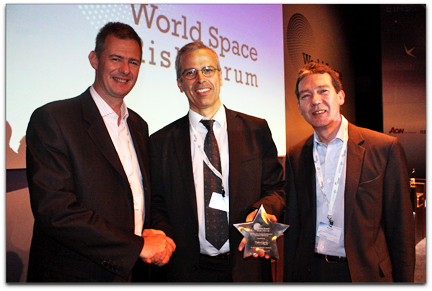Thales Alenia Space was taking part in the World Space Risk Forum from March 1 to 3 in Dubai, United Arab Emirates and was participating in the panel discussing technical developments in the space industry, showcasing as an example the rescue of the Palapa-D communications satellite. It was for this achievement that Thales Alenia Space received the “space rescue award” from the insurers.
 The Palapa-D satellite, launched on August 31, 2009, had been placed into a lower than normal transfer orbit. As soon as contact was established with the satellite several hours later, it was determined to be in nominal condition. Along with the customer Indosat, and in partnership with Telespazio, the decision was quickly reached to deploy a rescue strategy. The satellite’s apogee was first raised using three perigee maneuvers, following which the normal orbital positioning sequence could be carried out. The remaining steps proceeded smoothly and the satellite passed its final in-orbit acceptance tests on October 28, 2009.
The Palapa-D satellite, launched on August 31, 2009, had been placed into a lower than normal transfer orbit. As soon as contact was established with the satellite several hours later, it was determined to be in nominal condition. Along with the customer Indosat, and in partnership with Telespazio, the decision was quickly reached to deploy a rescue strategy. The satellite’s apogee was first raised using three perigee maneuvers, following which the normal orbital positioning sequence could be carried out. The remaining steps proceeded smoothly and the satellite passed its final in-orbit acceptance tests on October 28, 2009.
Several factors contributed to the success of this rescue operation, starting with the quick responsiveness and outstanding professionalism of Thales Alenia Space’s staff. Coupled with the high level of confidence expressed by the customer Indosat, this enabled making the quick decisions that were indispensable to the satellite’s survival. Another key factor was the organisational capability needed to quickly redefine a new mission and immediately deploy it, even though the situation wasn’t covered by standard strategies.
The exclusive design of the Spacebus 4000 platform played an essential role in rescuing the satellite, particularly its incorporation of star sensors, enabling the perigee maneuvers to be carried out securely and fuel-efficiently. More generally, the design of the avionics suite gives ground controllers an excellent vision of what was going on inside the satellite, thanks to the onboard software developed and tested in-house by Thales Alenia Space, and a powerful Failure Detection, Isolation and Recovery (FDIR) system. By quickly resolving these problems, Thales Alenia Space was able to deliver a satellite in operational condition, with a service life still exceeding 10.5 years. This achievement translated into concrete benefits for both the customer Indosat and the space insurance industry.
skip to main |
skip to sidebar

My Friend List

Custom Search
Arquivo do blog
-
▼
2010
(7)
-
▼
02/28 - 03/07
(7)
- Station Gains Unparalleled Views
- Orbital Sciences — Gloms Onto General Dynamics Spa...
- OmniGlobe Is Not Sitting Still For Sale Of Sat-Comm
- Eutelsat — Capacity For ZON'ing In Angola
- Telesat — Good News For Canadian SatOps
- Thales Alenia Space — A Stellar SatRescue
- Here's Looking @ Earth — A Downright Dusty Dominio...
-
▼
02/28 - 03/07
(7)
-
►
2009
(52)
- ► 08/09 - 08/16 (3)
- ► 07/26 - 08/02 (5)
- ► 07/12 - 07/19 (17)
- ► 01/18 - 01/25 (12)
- ► 01/11 - 01/18 (6)
- ► 01/04 - 01/11 (9)
-
►
2008
(45)
- ► 12/21 - 12/28 (12)
- ► 12/14 - 12/21 (9)
- ► 12/07 - 12/14 (24)


0 comments:
Post a Comment